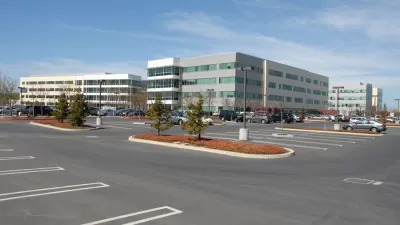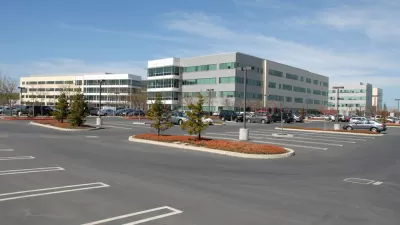To provide room for long-term expansion, companies like Google, Facebook, and LinkedIn are buying up even more Bay Area real estate. Their flush cash reserves have them nudging out the traditional development and investment crowd.

Tech giants including Google and Facebook are engaged in a Silicon Valley land grab. From the article: "The companies' newfound hunger for real estate offers a glimpse into their remarkable ambitions for expansion. Google reported it grew by about 5,800 employees world-wide in 2014, bringing the total to 53,600. Facebook boosted its head count by 45% last year to 9,199, growth it expects to continue."
Concentrated mainly in the Bay Area, new commercial and industrial spaces will give the companies ample room for future expansion. Their land banking has introduced a new dynamic into the local market. "The flurry of acquisitions is reshaping the landscape of the competitive world of Silicon Valley property, with tech companies often out-competing the developers and investment firms that traditionally dominate the sector."
With the exception of Apple, currently building a new headquarters in Cupertino, CA, most of the major tech firms actively acquired real estate in 2014. They expect long-term growth: "The tech giants have a leg up on developers and investors because they can tap their enormous piles of cash. They are happy to buy property now and then collect rent, perhaps for years, while they plot their expansions."
FULL STORY: Google, Facebook, LinkedIn Want to Make Sure They Have Space to Grow

Study: Maui’s Plan to Convert Vacation Rentals to Long-Term Housing Could Cause Nearly $1 Billion Economic Loss
The plan would reduce visitor accommodation by 25,% resulting in 1,900 jobs lost.

North Texas Transit Leaders Tout Benefits of TOD for Growing Region
At a summit focused on transit-oriented development, policymakers discussed how North Texas’ expanded light rail system can serve as a tool for economic growth.

Why Should We Subsidize Public Transportation?
Many public transit agencies face financial stress due to rising costs, declining fare revenue, and declining subsidies. Transit advocates must provide a strong business case for increasing public transit funding.

How Community Science Connects People, Parks, and Biodiversity
Community science engages people of all backgrounds in documenting local biodiversity, strengthening connections to nature, and contributing to global efforts like the City Nature Challenge to build a more inclusive and resilient future.

Alabama: Trump Terminates Settlements for Black Communities Harmed By Raw Sewage
Trump deemed the landmark civil rights agreement “illegal DEI and environmental justice policy.”

Dear Tesla Driver: “It’s not You, It’s Him.”
Amidst a booming bumper sticker industry, one writer offers solace to those asking, “Does this car make me look fascist?”
Urban Design for Planners 1: Software Tools
This six-course series explores essential urban design concepts using open source software and equips planners with the tools they need to participate fully in the urban design process.
Planning for Universal Design
Learn the tools for implementing Universal Design in planning regulations.
City of Santa Clarita
Ascent Environmental
Institute for Housing and Urban Development Studies (IHS)
City of Grandview
Harvard GSD Executive Education
Toledo-Lucas County Plan Commissions
Salt Lake City
NYU Wagner Graduate School of Public Service




























